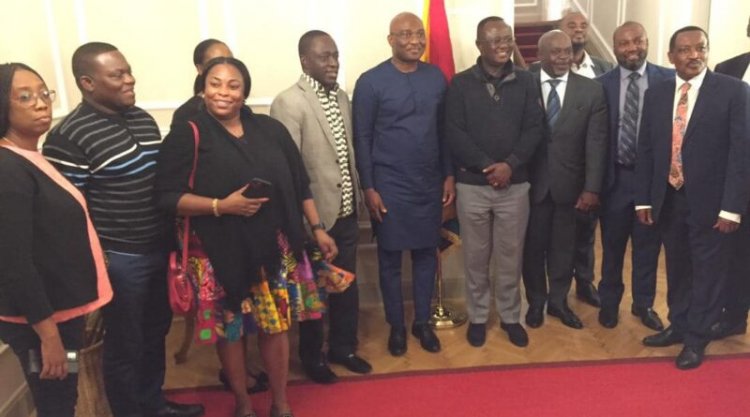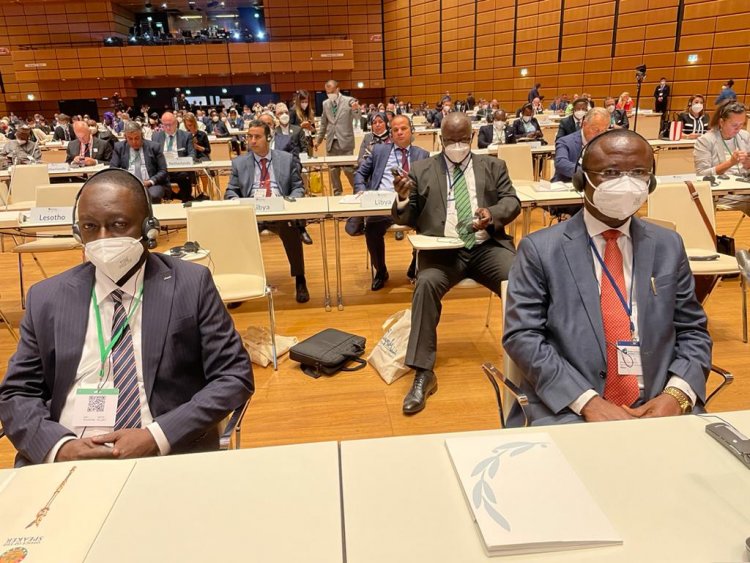First deputy speaker Joseph Osei-Wusu leads Ghana delegation to IPU
The Speakers' conference is scheduled to commence on September 7th and 8th in Vienna in Austria.

The first deputy speaker of Ghana's parliament, Joseph Osei-Wusu has led a delegation to attend the fifth Interparliamentary Union (IPU) speakers conference in Vienna, Austria.
The conference which is scheduled to commence on September 7th and 8th will focus on the first global summit on counter-terrorism organized by the Interparliamentary Union and the united nations office on drugs and crime also on the 9th of September,
Presenting a statement during the conference, Mr Joseph Osei-Wusu provided that, it is a truism to state that the Covid-19 Pandemic has come to stay, at least, in the foreseeable future.
He noted that the impact of covid has been devastating to the global economy just as it has constrained the space for good governance around the world.
The quest for the containment of the pandemic has scaled up the use of emergency powers by several governments in the world giving rise to the widespread abuse of those powers.

According to Joe wise, the threat to democracy occasioned by this appears to be more catastrophic than the losses that have been experienced by humanity during the pandemic as the world risks losing the dividends of democracy should we fail to act in unison and fast enough.
Mr speaker indicated that the shrinking space of democracy as a result of the search for solutions to the pandemic has been characterised, in some countries, by the excessive use of emergency powers by the Executive arms of government, often reflecting in decisions taken without recourse to the legislature, in some cases, without due consideration to the concerns of Opposition parties and in most cases, very repressive in their outlook.
Such decisions, devoid of public inputs do not often reflect the preferences of the governed neither do they guarantee the public choices making them liable to scaling down the standard of living of the people.
Human rights abuses are inherent in this as basic freedoms are denied to the people.
The use of draconian measures to impose far-reaching restrictions in certain parts of the world, the expansion of the emergency powers of certain governments around the world beyond the reasonable remit of the law and the suppression of media freedom to publish anything other than what is politically correct from the perspective of governments, among others, are examples of undemocratic measures undertaken by certain governments under the guise of fighting the pandemic through the instrumentality of emergency powers.
There is no gainsaying the fact that emergency powers are essential in dealing with major global challenges including the Covid-19 Pandemic.
It is, however, for good reason that the laws of most countries require that emergency measures undertaken by governments are brought to the legislature for ratification and, particularly, for extension beyond the minimal terms that the laws often grant governments to exercise.
In Ghana, the Imposition of Restrictions of legislation granted the President of the country to deal with the pandemic limited any emergency regulation enacted to a maximum period of three months in the first instance and an extended period of only three months when it was necessary.
That way, Parliament retained its control of the regulatory authority of the country. In this day and age when the Sustainable Development Goals call for inclusive approaches to ensure that development is holistic and participatory to ensure sustainability, fighting the pandemic cannot take a different path for improved results.
Altogether, the legitimacy granted by the Parliamentary approval of the use of emergency powers by governments is complemented by the implicit consent of the public to cooperate with the government in finding a lasting solution to the problem.
In the light of the foregoing, it is my considered opinion that it is always necessary to subject the use of emergency powers by the government to regular legislative scrutiny and reviews.
E K Ansah, Parliament


 Joana Somiah
Joana Somiah 

































